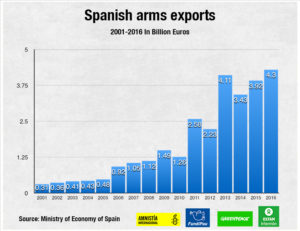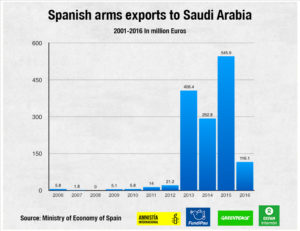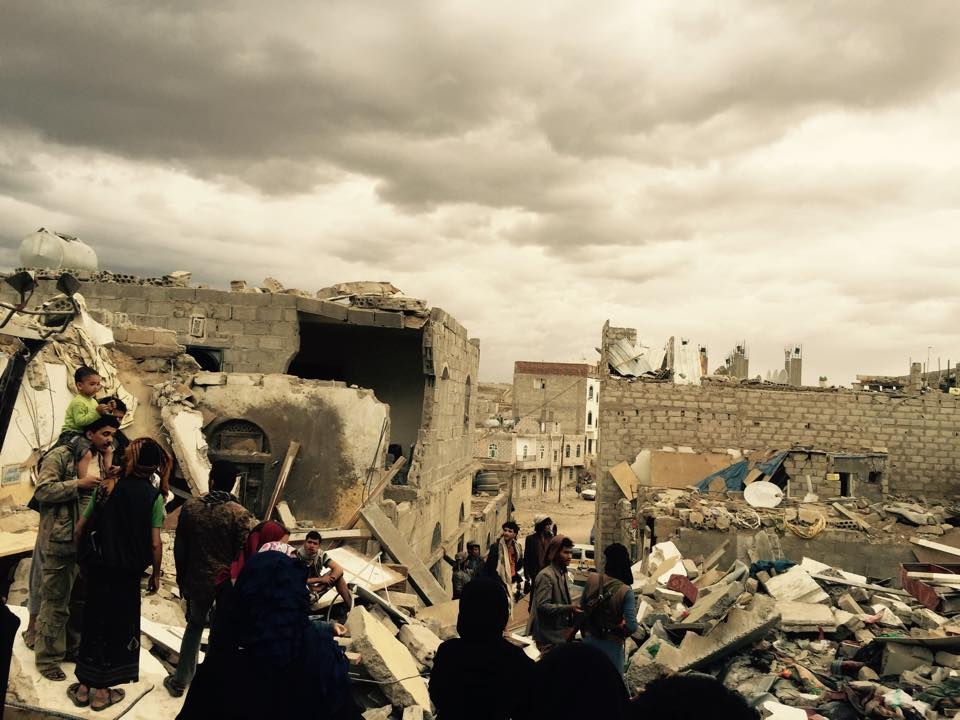The Secretary of State for Foreign Trade will appear in Congress tomorrow Tuesday to discuss Spanish arms sales in 2016
The Spanish Control Arms campaign demands the cessation of Spanish arms sales to Saudi Arabia and Iraq
Congress’ Official Secrets Committee urged to review the minutes of the Inter-ministerial arms licensing body that authorised arms exports to Saudi Arabia and Iraq
(Madrid/Barcelona).- The Spanish Control Arms campaign (Amnesty International, Greenpeace, FundiPau and Oxfam Intermón) launched today a report highlighting the risk of complicity in the commission of crimes under international law shown by certain Spanish arms exports in 2015 y 2016. Spanish arms exports were worth over € 3,924 million in 2015 and over € 4,362 million in 2016.
The report examines the official statistics of arms sales in 2015 and 2016 and identifies exports of concern of several types of arms in this period to Saudi Arabia, Bahrain, Brazil, Colombia, Egypt, Iraq, Israel and Turkey, based on the substantial risk that they may contribute to commit or facilitate serious violations of international law. The NGOs highlight the arms exports to Saudi Arabia and Iraq as examples of the need for the Inter-ministerial arms licensing body to improve the risk assessment of the use of the arms in contravention of international law.
The NGOs criticise the export of ammunition and munitions, mortar shells, several systems and various equipment and planes to Saudi Arabia worth over € 650 million in this period despite the substantial risk they may contribute to commit or facilitate serious violations of international human rights law or international humanitarian law in Yemen. The other example of risk of complicity in the commission of crimes under international law is the export of ammunition and munitions, mortar shells and armoured vehicles worth almost € 140 million € for the armed forces in Iraq despite the deterioration of the human rights situation and the risk of diversion of the arms that could fall in ISIS hands. The report also identifies 16 other operations of potential concern on which more details are required.
The NGOs propose a decalogue of recommendations to the Government and Congress to improve transparency, exports control and parliamentary scrutiny. The NGO recommendations include the request that the Congress’s Official Secrets Committee review the minutes of the arms licensing decisions to Saudi Arabia and Iraq authorized by the Inter-ministerial Board regulating the arms trade. Pursuant to a decision by the Council of Ministers on 12 March 1987, the minutes of this body are secret. December 2017 will mark the tenth anniversary of the adoption of Act 53/2007 on arms trade control.
For Esteban Beltrán, director of Amnesty International, “Any possible arms sale to Saudi Arabia which may be used in Yemen is illegal because they breach international and Spanish law on the arms trade”. Beltrán called on the government “not to authorise arms sales to this country, including the potential contract that the public company Navantia has been negotiating to build five corvettes for the Saudi army, as long as there remains a
substantial risk that they may be used to commit or facilitate serious violations of international law or be diverted”.
Chema Vera, director of Oxfam Intermón highlights the “humanitarian catastrophe caused by the war in Yemen, which is on the brink of famine and where over 21 million people require humanitarian assistance to cover their basic needs, in a crisis exacerbated by the naval blockade of Yemen”. The Saudi-led coalition has bombed schools, hospitals, markets and mosques and has acknowledged using cluster munitions in a conflict where all parties have committed serious violations and abuses.
The Spanish government claims that in all the end-use documents associated to the licenses authorised to Saudi Arabia in 2015 and 2016, the authorities in this country certified that the equipment and the ammunition would be for internal use and under no circumstances would they be re-exported with the approval of the Spanish government. Also, the government says the guarantees established in the end-use certificate models were strengthened since the coup d’état in Yemen in March 2015 and the intervention of the Arab League countries.
Mario Rodríguez, director de Greenpeace, calls on the government to clarify whether those “strengthened” guarantees are legally binding and to provide details on what they consist in. “This raises many questions. Given the appalling Saudi record on the use of arms in Yemen including the commission of alleged war crimes, the reports of diversion of arms to armed groups in Syria and the presence of Spanish arms in Yemen, there is a reasonable doubt, so we urge the government to stop exporting arms to Iraq and cease arms sales to Saudi Arabia that may be used in Yemen”. Rodríguez urges the Secretary of State for Trade to discuss these issues in detail in her appearance in Congress tomorrow, Tuesday. He wonders what the mechanisms to strengthen the end-use verification are and whether the Spanish embassy in Saudi Arabia is monitoring the use of those arms in the field.
Jordi Armadans, director of FundiPau, wonders how the Spanish government can guarantee that the arms exported to Iraq will not be used to commit gross violations of human rights and International Humanitarian Law in the Iraqi internal armed conflict, noting the risk of the diversion and the arms may fall in the hands of ISIS. “It is time to take stock and continue to make progress in terms of transparency and parliamentary control of the Spanish arms trade”. This is why, to mark the occasion of the 10th anniversary of the adoption of the Spanish law on arms trade, he calls for the establishment of a parliamentary subcommittee to review the enforcement of Act 53/2007 where the civil society is listened to, and to identify measures to strengthen transparency, exports control and parliamentary control mechanisms.





